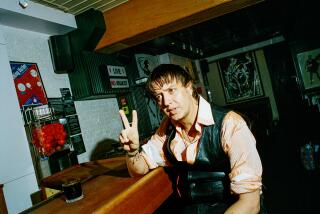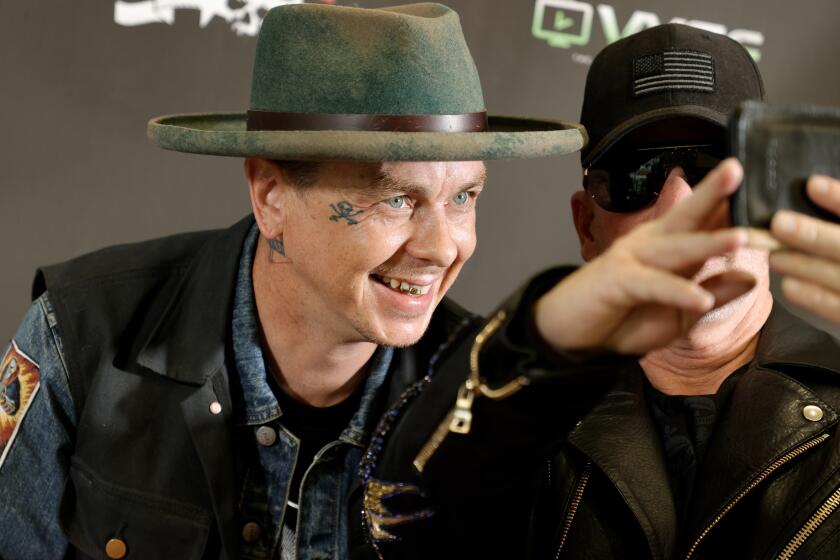Refuge in the Music
Given the difficulty such acclaimed and popular rap groups as Arrested Development and Digable Planets had in maintaining their initial success, you’d think the members of the Fugees would be devoting all their attention to making sure the trio’s next record stayed on track. Instead, two of the members--Wyclef Jean and Lauryn Hill--are doing solo albums before recording the follow-up to the Fugees’ 6 million-selling “The Score.”
“When you can pinpoint what we’re going to do next, that’s when things get boring,” explains Jean, whose album, “Wyclef Jean Presents the Carnival,” arrives Tuesday. “It’s important to take chances.”
On the album, the Haitian-born New Jerseyite, 26, explores his Haitian roots and his youth in Brooklyn, as well as the pain of losing loved ones to violence. On the eve of the record’s release, Jean spoke about everything from his restless musical appetites to staying grounded with his culture in the midst of worldwide fame to his recent return to his homeland.
*
Question: Almost all hip-hop talks about the street, how you’re living and what you’re seeing day to day. How do you keep that subject from getting stale, since so many people cover the same territory?
*
Answer: You ever see that movie “Donnie Brasco”? You know why I like that movie? It didn’t just
glorify the mob with all these women, money and glamour but instead focused on poor soldiers who had a hard, working-man-type existence, who would never be big shots. Reality is what I try to represent. “The Carnival” is a reflection of me leaving Haiti and growing up in the projects and everything from culture shock and putting together a gun at 13 to being held up at gunpoint for my coat. I go through all my experiences on this album, just to let cats know that it wasn’t all easy. I could have been a statistic.
Q: One concept that you’ve stressed as the key to your success is the spiritual essence of music. Is it still an important aspect of your life?
A: It’s what keeps me grounded, after all those records sold, to make a record that sticks close to my true culture. I’m from the genre of all music. From disco, classical, rock, country, it’s all in there. The Fugees make music for all people.
Q: “The Carnival” features a wide cross-section of musical tastes and genres. You do hip-hop, but there are also songs like the Cuban anthem “Guantanamera,” and “Sang Fezi” and “Jaspora,” which are sung completely in French patois.
A: Yeah, it’s all over the place, because I wanted it to be. I believe we’re all a part of the same musical essence. In the beginning, some scientists say, was the Big Bang. I believe that sound was created with that bang, and from sound came everything else. And we’re still a part of that bang.
Q: You returned to Haiti in April when the Fugees played there at the “Coming Home Concert.” What was it like to go back to your country as a prodigal son?
A: It felt great. It shook the country up, because I don’t think anyone expected 80,000 people to show up for one concert. When other rappers talk about being Gambinos and other types of Mafia-type people, I laugh. You wouldn’t know my power until I go to Haiti and there are 3,000 soldiers behind me, my age, carrying Uzis, waiting for me to make my move. It felt beautiful for my father to leave for political reasons, and for me, a rebel son, to return and be treated like a hero.
Q: What are your first memories of growing up in Haiti?
A: Probably the rah-rah bands. There was a carnival every year. I remember running on the side of the road when they passed through, playing with a bottle and a stick to keep rhythm. My family found me four hours later. Someone in the parade picked me up and made me a part of the throng, carrying me on their shoulders. I remember the sounds of the bells and whistles, but I also remember the violence and the mystical power of the whole scene.
Q: When you moved to America at age 9, could you speak any English?
A: None. I actually learned English by listening to rap music. It’s deep, because that’s how a lot of foreigners learn, through rap or through television. It was funny, because I couldn’t speak English, but I knew all the words to “Rapper’s Delight” and Kurtis Blow’s “The Breaks.” That’s how I got introduced to hip-hop.
Q: Growing up in Brooklyn’s Marlboro Projects exposed you to a lot of ugly things. How does that affect you now?
A: Coming from the ghetto teaches you how to read people really quickly. You can immediately tell people who respect Wyclef the Fugee who produced million-dollar records but not Wyclef who was cleaning cars and worked in Burger King. [People] shoot at each other in the ‘hood, [but] it’s with the same passion that we watch each other’s backs. We just need to cut out the senseless violence, which is something I express in the music.
Q: Your father is a Baptist minister. Did he feel that hip-hop was a detrimental force?
A: Not just hip-hop but anything that didn’t say “God” or “Jesus is coming back.” Everything else, as far as he was concerned, was devil music. My father would whup my ass for playing rap. He couldn’t understand English well at the time, but I had to play music in the house that sounded like Christian music to him. I could get away with listening to Pink Floyd’s “Wish You Were Here,” I could listen to the Police, but when he heard a rap beat, he’d say, “Turn that off!”
It got really bad when, at 17, I started going to the recording studios and sneaking in the house later at night through the roof, and he’d be waiting for me in the dark with a thick belt. It got to the point where he would nail the front door shut so I would freeze to death outside in order to learn that Jesus Christ was the way.
Q: Does he feel different now?
A: He’s proud of me. He’s like, “Better this than I see you on Channel 7 with your hands cuffed behind your back.”
* Solo Play: ‘Carnival’ shows why Wyclef Jean is the key Fugee. F14
More to Read
The biggest entertainment stories
Get our big stories about Hollywood, film, television, music, arts, culture and more right in your inbox as soon as they publish.
You may occasionally receive promotional content from the Los Angeles Times.










